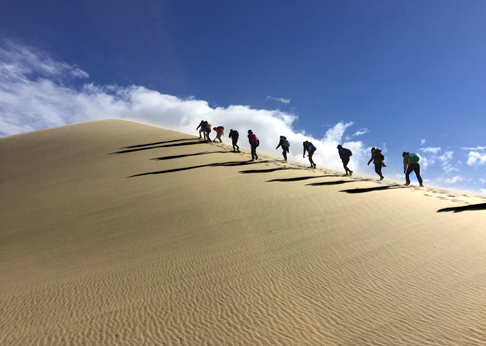University of Scranton’s ‘A Desert Experience’ Retreat Wins National Award

In the Christian tradition, a desert is a vast, dry, often-unexplored place, but it’s also a place of discernment and prayer, a place where people go – or are led – to figure out what’s next or why the present, no matter how challenging, matters.
That’s the idea behind “A Desert Experience,” a retreat designed by University of Scranton campus minister Fred Mercadante that recently won the Ignatian Medal for Outstanding Campus Program or Initiative at the Jesuit Association of Student Personnel Administrators’ annual April conference in San Antonio, Texas.
Mercadante described the “A Desert Experience” retreat process as a unique and transforming experience that insists that students not be complacent on their faith journey but go to deeper places, “perhaps even to places that feel uncomfortable at first.”
One such place is Death Valley National Park, California, America’s hottest and driest national park as well as the largest in the lower 48 states.
The University-designed retreat to that “land of extremes,” which began in 2013 and takes place each year at the conclusion of the fall semester, invites students – 25 of them in 2016 – to learn and practice contemplation while hiking, exploring and camping in the park.
The five-night experience, Mercadante said, challenges students to reflect on and discuss themes that lay the groundwork for a contemplative disposition.
“We immerse ourselves into the different and unique landscapes of the park to aid in each day’s reflection,” he said.
The experience has five main goals, which relate to faith formation and adult spirituality, cultivating a new view of the realities of life, teaching students to pray with nature, building community and fellowship and fostering total personal growth.
Results, Mercadante said, are similar, in that participants emerge closer to their true selves, become aware of the dying and rising prevalent in their lives, better recognize, acknowledge and celebrate God’s revelation, develop a wider perspective and learn to surrender ego and control.
Students have testified to the retreat’s success in achieving those goals and results.
“I was challenged spiritually with tough questions that I still think about to this day,” said Kaitlyn Davis ’17, a biology and philosophy major from South Abington Township.
Mercadante said the desired outcome of all Campus Ministries’ programs is always conversion, which is not easily measured, but student testimony is one way to conclude that a transformation has taken place.
Take it from Bryan Gorczyca ’19, an exercise-science major from Colonia, New Jersey, who said, “The week spent in Death Valley tested every member of our group physically, mentally and spiritually through many tasks and challenges which brought us all to a new outlook on ourselves, others and Mother Nature. At no time in my life have I experienced such peace with the world as I did in the silence of reflection on this retreat. … I have come out a better version of myself.”
Mercadante said conversion is ongoing and gradual and most students who have participated in the retreat remain active in Campus Ministries or have become campus-ministry leaders.
“All indications are that the retreat meets and exceeds its goals and objectives and has proven to be a transformative experience,” he said.
The Ignatian Medal for an Outstanding Campus Program or Initiative, established in the spring of 1997, is the only Ignatian Medal awarded to an institution rather than to an individual and is designed to recognize creativity, focus, adaptability and proven effectiveness in student-affairs work that meets student needs and resolves campus conditions that impede the educational process.
The University offers more than a dozen retreats for students each semester through its Campus Ministries Office. Most of the retreats take place at the University’s Retreat Center at Chapman Lake.






